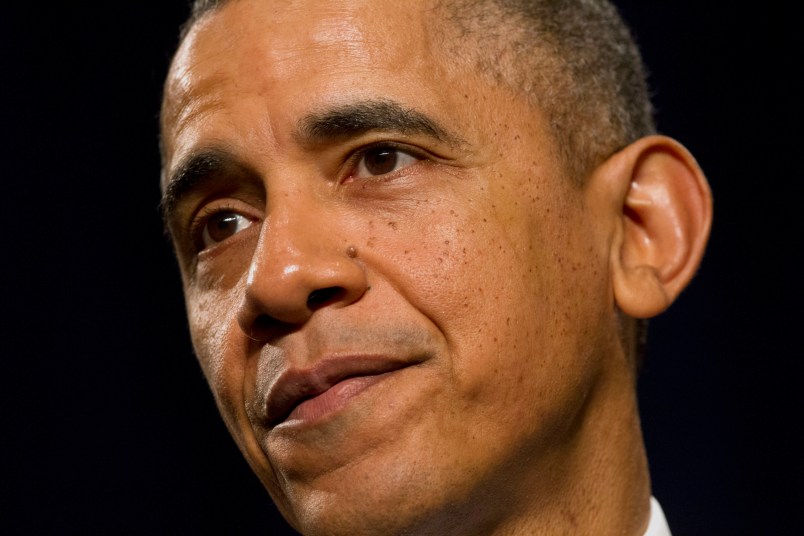Of the roughly 5.4 million people who purchased health insurance through HealthCare.gov this year, 87 percent — 4.7 million — received premium tax credits, according to the latest estimate from the U.S. Department of Health and Human Services.
Those are the people who would stand to lose their financial benefits under Obamacare if the U.S. appeals court decision on Tuesday that invalidated the subsidies offered through the federal website were to stand.
The court’s decision was a stunning loss for the Obama administration and the health care reform law. Most considered the lawsuit challenging the tax credits available through HealthCare.gov to be a last Hail Mary legal effort with little to no chance of success. Now, the law’s supporters must rely on another appeals court panel — and possibly the Supreme Court — to uphold the subsidies that are crucial to the law’s goal of extending health coverage.
The Obama administration said after the ruling that it would not have any immediate impact on those 4.7 million people or the subsidies because the ruling would be appealed.
“This ruling does not have any practical impact on their ability to receive tax credits right now,” White House Press Secretary Josh Earnest said Tuesday.
But if the ruling were to stand all the way through the Supreme Court, that 4.7 million figure is the minimum number of people who would lose access to the law’s financial help. Unless, of course, some of the 36 states being served by HealthCare.gov elected to set up their own marketplaces in the wake of the court’s decision.
In addition, millions more people were expected to enroll in private coverage through Obamacare in the coming year. The Urban Institute estimated recently that 7.3 million would be receiving subsidies through HealthCare.gov by 2016. That number was expected to continue rising over the next decade.
And what happens to those people already receiving subsidies after they lose access to them? The big question — would they have to pay them back? — does not have a clear answer, though some are doubtful.
“I doubt the ruling would be retroactive,” Tim Jost, a health law professor at Washington and Lee University who supports Obamacare, told TPM following the ruling. “I don’t think we have an idea of what would happen,” Linda Blumberg, an economist at the Urban Institute, told TPM.
“At this point, we do not know whether the decision would be retroactive or not,” Caroline Pearson, vice president at Avalere Health, an independent consulting firm, told TPM on Tuesday. “It likely depends on the details of the final ruling.”
What is more certain is that those people would lose access to the subsidies going forward. HHS had estimated that the average premium reduction afforded by the tax credits in 2014 was 76 percent. Avalere Health estimated recently that customers would see their premiums spike by that much, 76 percent, if the subsidies through HealthCare.gov were cut off.
“States, Congress, and the Administration will be under immense pressure to act to prevent large premium increases if the courts ultimately rule that individuals in federal exchanges are not eligible for tax credits,” Elizabeth Carpenter, director at Avalere Health, said in a statement. “No doubt the politics surrounding the Affordable Care Act will make any action difficult and could potentially make insurance unaffordable for millions of Americans who are already enrolled today.”
Via @CPearsonAvalere, a state-by-state look at how much premiums would shoot up if Halbig stands: pic.twitter.com/xURNRN0wS7
— Dan Diamond (@ddiamond) July 22, 2014







assuming it could get thru a state legislature, what more would have to be done beyond copy, paste, rename of federal exchange for that state?
Where o where are you today. Silence is golden.
So Republicans just took health insurance away from 4.7 million Americans, because they loath 47% of America for having the audacity to be the working poor? Doesn’t fit on bumper sticker but works in Ads, throw in a little ‘activist Judge’ and you hit Ad pay dirt.
Except they won’t, just yet, because the full court has a 7 - 4 Dem majority, so could we stop with the hair on fire, already?
You do realize the full court will probably overturn this decision. And next, answer me this; Why is the right so against people having access to both affordable health insurance and healthcare? Why are you so enamored of the previous status quo that was going to drive healthcare cost up to 25% of GDP, a economically unsustainable number, and a number which makes us less competitive globally and certainly was not delivering better healthcare outcomes.